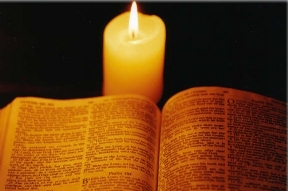 In chapter forty-eight, Benedict sets forth an observance which is still prevalent in our order. He is talking in that chapter of the daily manual labor but he goes on to say:
In chapter forty-eight, Benedict sets forth an observance which is still prevalent in our order. He is talking in that chapter of the daily manual labor but he goes on to say:
During the days of Lent, they should be free in the morning to read until the third hour, after which they will work at their assigned tasks until the end of the tenth hour. During this time of Lent each one is to receive a book from the library, and is to read the whole of it straight through. These books are to be distributed at the beginning of Lent. [4]
Benedict is speaking of lectio which consists of lectio (reading), meditatio (reflection), oratio (response), and cotemplatio (rest) [5]. The idea was that you began by letting the Lord have the first word. For monks back then, lectio did not always mean reading a book in the sense that today we can easily pick up a book. They did not have books and very few even knew how to read. In most monasteries, though, choir monks were taught to read. Lectio in Benedict’s time was calling up to memory what was previously memorized.
Older monks will remember spending most of your postulancy memorizing psalms and prayers. We memorized the Little Office of the Blessed Virgin. So we carried a lot of the scriptures in our head. In Benedict’s time, even more memorization was being done. Lectio was a time when you sat down and let the Lord speak to you. You then responded to that and moved into contemplation.
During Lent, Benedict provided extra time for reading as well as a special book to be read. He said, “During this time of Lent each one is to receive a book from the library, and is to read the whole of it straight through.” In a way, a special word from of the Lord was to be heard during Lent.
When I was a young religious, you had no say about the book. You were just given a book. On the first Sunday of Lent you would be thinking, What am I going to have to read for the next forty days? For both my first and second year novitiate, I was presented with Saint Alphonsus Liguori’s The Glories of the Blessed Virgin Mary. In recent times, for the monasteries who still have the distribution of books, each monk usually chooses the book himself or talks it over with his spiritual guide. It is spending significant time with that particular book and that particular author which helps in the entering into the Paschal mystery.
Benedict goes on to say:
Above all, one or two seniors must surely be deputed to make the rounds of the monastery while the brothers are reading. Their duty is to see that no brother is so apathetic as to waste time or engage in idle talk to the neglect of his reading, and so not only harm himself but also distract others. If such a monk is found-God forbid-he should be reproved a first and a second time. If he does not amend, he must be subjected to the punishment of the rule as a warning to others. Further, brothers ought not to associate with one another at inappropriate times. [6]
Benedict also speaks about Sunday as being a day for lectio [7].
NOTES
4. RB 48:14-16.
5. See M. Basil Pennington, Lectio Divina: Renewing the Ancient Practice of Praying the Scriptures (New York: Crossroad, 1998).
6. RB 48:17-21.
7. RB 48:22-23.
 This is part four of a talk given on the Rule of Saint Benedict by Abbot M. Basil Pennington, OCSO; Our Lady of the Holy Spirit Monastery. Sunday, February 4, 2001
This is part four of a talk given on the Rule of Saint Benedict by Abbot M. Basil Pennington, OCSO; Our Lady of the Holy Spirit Monastery. Sunday, February 4, 2001
© Our Lady of the Holy Spirit Monastery, 2006
